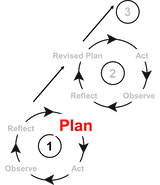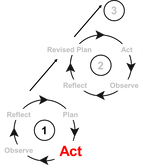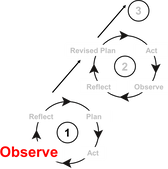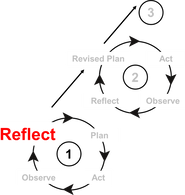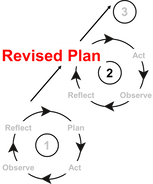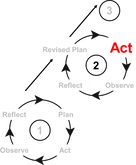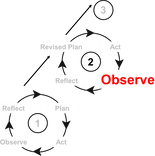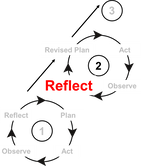This is a brief description of the initial two phases of my community engagement project, organised using the action research spiral (Zuber-Skerrit, 2001).
Phase 1
|
PLAN
While designing the activity trail, these are some of the things we kept in mind:
|
- When creating activities that leverage contextualised learning, it is important to first know the contexts that are most relevant and relatable to the learner, and not the designer. With that understanding, the activity can be then designed to focus on pre-existing knowledge and skills and use them in a novel situation (Rivet & Krajcik, 2007).
- Experiential learning is learning by doing. The focus here is not on the product but rather on the process of learning (Kolb, 1984). Inquiry-Based learning occurs when students solve a novel and perplexing problem, with some amount of scaffolding and guidance (Hmelo-Silver, Duncan, & Chinn, 2007).
- During discovery based learning, students work independently to gain a deeper understanding of the process around them (Alfieri, Brooks, Aldrich, & Tenenbaum, 2011).
- In activities focused on service learning, students are encouraged to think about issues that have real-world consequences and come up with potential solutions (Bringle & Hatcher, 1999).
|
ACT
|
|
REFLECT
At the end of the first phase it quickly became evident that we need to make two major changes:
|
Phase 2
|
PLAN
In the Phase 2 planning stage we:
|
Phase 3 onwards
The trail has gone through several more iterations and still goes strong!
References:
- Alfieri, L., Brooks, P. J., Aldrich, N. J., & Tenenbaum, H. R. (2011). Does discovery-based instruction enhance learning? Journal of Educational Psychology, 103(1).
- Bell, P., Tzou, C., Bricker, L., & Baines, A. D. (2013). Learning in diversities of structures of social practice: Accounting for how, why and where people learn science. Human Development, 55(5–6), 269–284. https://doi.org/10.1159/000345315
- Bringle, R. G., & Hatcher, J. A. (1999). Reflection in service learning: Making meaning or experience. Educational Horizons, Spring, 179–185.
- Griffin, J. (1994). Learning to learn in informal science settings. Research in Science Education, 24(1), 121–128.
- Griffin, J., & Symington, D. (1997). Moving from task‐oriented to learning‐oriented strategies on school excursions to museums. Science Education, 81(6), 763–779.
- Hmelo-Silver, C. E., Duncan, R. G., & Chinn, C. A. (2007). Scaffolding and Achievement in Problem-Based and Inquiry Learning: A Response to Kirschner, Sweller, and Clark (2006). Educational Psychologist, 42(2), 99–107.
- Klug, M. J., Hodder, J., & Swain, H. (2002). The Role of Biological Field Stations in Education and Recruitment into the Biological Sciences. In Report of the NSF-sponsored workshop,“Education and Recruitment into the Biological Sciences: Potential Role of Field Station and Marine Laboratories.”
- Kolb, D. A. (1984). Experiential Learning: Experience as The Source of Learning and Development. Englewood Cliffs, NJ: Prentice-Hall, Inc.
- National Research Council [NRC]. (2009). Science Learning in Designed Settings. In Learning Science in Informal Environments: People, Places, and Pursuits. Washington, DC: The National Academies Press.
- National Research Council [NRC]. (2012). A Framework for K-12 Science Education: Practices, Crosscutting Concepts, and Core Ideas. Washington, DC: The National Academies Press.
- Price, S., & Hein, G. E. (1991). More than a field trip: Science programmes for elementary school groups at museums. International Journal of Science Education, 13(5), 505–519.
- Rivet, A. E., & Krajcik, J. S. (2007). Contextualizing instruction: Leveraging students’ prior knowledge and experiences to foster understanding of middle school science. Journal of Research in Science Teaching, 42(1), 79–100
- Zuber-Skerrit, O. (2001). Action learning and action research: paradigm, praxis and programs. In S. Sankaran, B. Dick, R. Passfield, & P. Swepson (Eds.), Effective Change Management Using Action Research and Action Learning: Concepts, Frameworks, Processes and Applications (pp. 1–20). Lismore, Australia: Southern Cross University Press.
